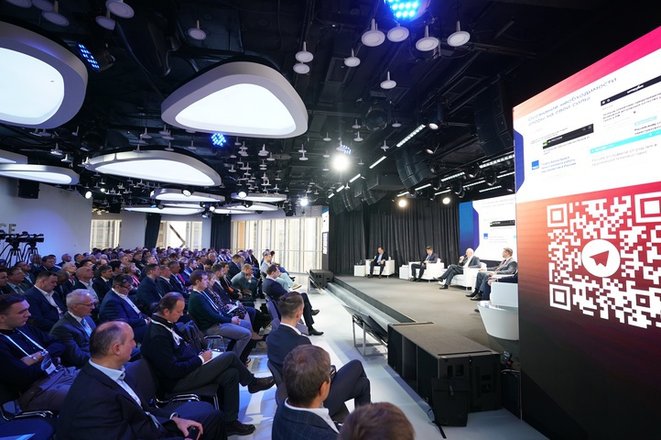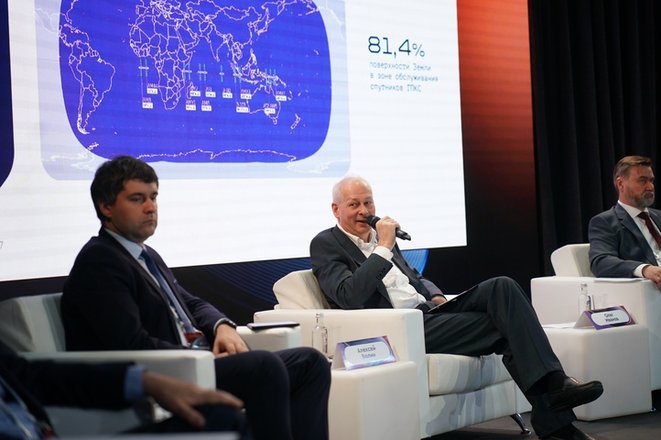A serious challenge – a worthy answer: the future of the Russian satellite market in the new realities was discussed at SATCOMRUS 2022
The 27th SATCOMRUS international conference was held on October 27th in Moscow. The event, by which its organizer, Russian Satellite Communications Company, celebrated the 55th anniversary of its foundation, became a platform for the dialogue between representatives of government authorities, satellite operators, telecom companies and broadcasters, as well as major manufacturers of devices and telecommunications equipment.
During three sessions, the experts exchanged their vision of trends and challenges in the telecommunications market and noted the contribution of RSCC to the development of the Russian satellite industry. Thus, in his congratulatory telegram, Anton Vaino, Chief of Staff of the Presidential Executive Office, emphasized the role of RSCC in creating unique space communication systems in the interests of strengthening the information security of the state, developing broadcasting in Russia, including hard-to-reach regions. During the plenary session, Alexey Volin, the company’s General Director, confirmed this idea using the example of Yakutia: despite the fact that fiber optic communications were very actively developing there, the demand for satellite resources in the republic had increased by almost 2.5 times, as each user needed increasingly more traffic. And the available satellites covered this need.
Space communications played an important role in the development of the Krasnoyarsk Territory, added Nikolay Raspopin, Minister of Digital Development of this region. According to him, there are now more than 1,700 settlements in the territory, many of which are in dire need of communication services. Earlier, as part of the project of the Ministry of Digital Development for connecting socially significant facilities, more than 4,000 points in the Krasnoyarsk Territory (mainly government agencies and authorities) were connected to a single network. “And more than 15% of these points, i.e. about 500, are connected via a satellite resource,” the Minister noted.
Russian satellite solutions remain in demand abroad as well. According to Alexey Volin, despite the sanctions and discriminatory actions of foreign partners, it is impossible to weaken and isolate our country. On the one hand, RSCC sees quite a lot of interest in the company's services from Latin America, Africa, and Asia. Through joint efforts with Intersputnik, projects have been implemented in Bahrain, Saudi Arabia, Malaysia; India and Indonesia are next in line. On the other hand, the Russian market will unite internally in order to establish the exchange of knowledge and not to fall out of trends and innovations in the domestic and international markets.
“The creation of an association of satellite communications market participants, which was announced a couple of months ago and which will soon begin active work, can play a big role. We need a platform to discuss the prospects for industry development, which should be attended by both operators and manufacturers, as well as consumers of our services and equipment developers. We need coordination of technical and technological policies, joint market research, collective preparation of industry conferences with the participation of friendly countries, as well as common work at the sites of those conferences that take place abroad,” said Alexey Volin.
Yuri Urlichich, Chairman of the Council of the Association of Satellite Communications Market Participants, shares this opinion. Consolidation of market players is also needed because the industry faces really ambitious plans under the new conditions. “[In these conditions] we need to act, not just talk. In order to do so, we need to be united — the Radio Research and Development Institute, M.F. Reshetnev ISS, Russian Satellite Communications Company. And, of course, we need the support from Krasnoyarsk, other regions, and the central government. And then, I promise, there will be not only factories for the production and transmission of energy, the manufacture of materials in orbit, but also orbital data centers, quantum communications, encryption, and other ambitious projects. And all this will be, first of all, for the good of Russia,” he said.
One of such promising areas — a direct "smartphone to satellite" connection — was mentioned by almost all participants of the conference. According to analysts, in the next 10 years this direction can bring in over $65 billion, and the total number of users will exceed 350 million people. “I clearly understand that we should go in this direction. And not only in the field of interfacing mobile and satellite communications, but generally the creation of hybrid networks, because subscribers do not care where they are and what technology they are currently using. And the transition should be cross-technological and absolutely seamless,” said Oleg Ivanov, Director General of the Radio Research and Development Institute. In his opinion, such hybrid networks should appear within a couple of years, given the number of startups working in this area. “China is vigorously rushing there, AST is conducting mass testing, satellites have been launched, Lynk was the first. Moreover, there is a tendency for such communication to become broadband, and it will need special solutions,” he summed up.
Another important trend — the transition to multi-orbital systems — was mentioned by many participants of the event: as Alexey Volin said, both low-flying vehicles and medium orbit vehicles were currently developed in parallel, while the demand for GEO services continued to increase, i.e. alternative services did not hinder the development of geostationary ones. Yevgeny Nesterov, Director General of Academician M.F. Reshetnev Information Satellite Systems JSC, in turn, noted that ISS worked in all market segments: GEO, high elliptical orbit, and low-flying vehicles. “The key projects for us are, of course, the projects of our “classic” and main commercial customer, RSCC. On a high ellipse, this is Express-RV. Skif satellites in medium orbit are a very promising connection that will complement geostationary ones,” said Yevgeny Nesterov. He added that covering the whole of Russia was a very expensive task, and hybrid solutions could help at the terminal level, which would allow reducing the cost of the service, rather than ordering “an incredible number of satellites that must connect every square meter and duplicate the beams already available from geostationary vehicles". The development of hybrid solutions that combine a wide range of services is part of the company's plans for the next 3-5 years.
During two other sessions, the participants discussed the delivery of media content and trends in the field of satellite TV, marine Internet service, the prospects for the development of the subscriber base of individual satellite Internet access, space technologies for the development of agriculture, as well as the needs of the Russian satellite communications market in modem equipment.
At the end of the event, the General Director of Russian Satellite Communications Company presented the already traditional SATCOMRUS Awards to distinguish the most significant merits of representatives of the satellite industry. The prize was awarded to REYS GC for the development and mass production of a line of satellite equipment and new generation VSAT stations; Raduga-Internet LLC for supporting subscribers of satellite broadband access in the Ka-band; the General Director of AmRussTel Alexander Tenyakshev for his personal contribution to the development of satellite communications in the Russian Federation. A statuette was also awarded to ROMANTIS BRASIL as the most successful partner of RSCC in Latin America, RTComm.RU JSC as the flagship of satellite Internet on the new Express-AMU7 satellite, and the Orion Group of Companies for maintaining stable Russian TV broadcasting and technical innovations.
The conference was held with the support of the general partner Academician M.F. Reshetnev Information Satellite Systems JSC, with ISATEL acting as a registration partner. Other partners of the event were Gilat, Ka-Internet JSC, Sputnikovaya Svyaz LLC, NTV-PLUS and Orion GC. The technical operator and partner in preparing the conference was Tsifrodinamika LLC.

